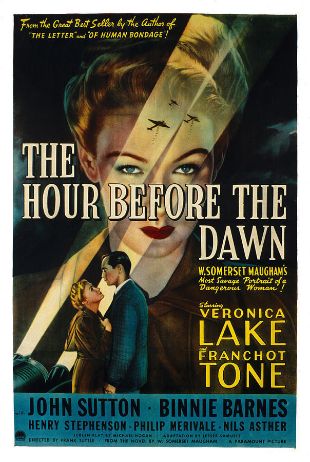The Hour Before The Dawn is a deeply flawed but fascinating thriller, with an especially peculiar history. Based on its credits, the movie should have been much better, as the work of director Frank Tuttle (This Gun For Hire), with a script by Michael Hogan, an English screenwriter whose work intersected with Alfred Hitchcock and Thorold Dickinson (and, according to scholar Ted Morgan, an uncredited contribution from Christopher Isherwood), and all based on a novel by W. Somerset Maugham, who certainly knew his way around a spy story. Maugham's basic story is just fine, and reasonably intelligent and even rather sophisticated, in terms of its approach to and grasp of ideas, for a picture done in Hollywood in the middle of the war -- a film about a man wrestling with the question about whether to follow his conscience, which tells him it is wrong to kill another human being, or to help defend and protect his country, would not have been out-of-place in America in 1942 or even 1943, though 1944 was a bit late in the war to be doing such a picture; and a good spy story is always welcome. The difficulty is that The Hour Before The Dawn is trying to be two movies -- a sincere drama dealing with personal conflict; and a spy story -- and succeeds at being neither. The material dealing with spies and fifth columnists is well done as far as it goes, despite some heavy-handedness in the some writing of certain scenes (one doubts that even when talking among themselves, German spies and saboteurs in the middle of wartime England would gleefully listen to Wagner played on the piano with sinister laughter, even if one of them happens to be a music teacher as a cover); but the issue of the hero's beliefs and their sincerity gets lost about halfway into the movie, when attention shifts to the espionage activity by the villains, and only makes a return at a strategic moment that is one of the most poorly written parts of the movie, when the well-meaning hero makes contact with a seemingly sincere pacifist (who is really a German agent who tips his hand too easily).
And from that point on, the struggle over conscience takes second place to the action, which unfolds at a breakneck pace. The whole second half of the movie has the look of something rushed, scripted and made on the cheap, an impression that is only heightened by the film's short running time (75 minutes, which makes it almost too short for an "A" feature -- only the presence of Franchot Tone and Veronica Lake, in the only movie she released in 1944, keep it out of the "B" category). Additionally, the cast seems to be not too involved with the material. Not that Franchot Tone, Henry Stephenson, and John Sutton don't give it a thoroughly professional effort -- they do, but one gets the feeling there were a lot of first takes used in this picture. And the screenwriting does finally fall down in the end, which is a ridiculous simplification of all that we've seen up to that point. Additionally, Veronica Lake's Austrian accent is shaky, and between her obvious struggle with it, and the poorly written and conceived part, she is a distinct drag to the film -- she's too weak an actress to overcome a role that isn't properly conceived from the start. The movie also has a score by Miklos Rozsa that is one of his poorer efforts, possibly because he was less motivated than usual as a composer by the on-screen mater ial. Incidentally, one wholly unexpected and notable element is the on-screen appearance in the opening credits of author Somerset Maugham, who is seen inscribing the manuscript's title page -- Maugham was living in America at the time and wrote The Hour Before The Dawn as a contribution to the war effort; the book was poorly received, and he reportedly never allowed it to be published in England, and although it was reprinted in America as late as 1960, he later removed it from his official list of published works. The movie itself, owing to the troubled history of the underlying book and the literary rights thereof, apparently hasn't been seen in decades, making it one of the most mysterious and elusive films in the respective outputs of Lake, Tone, Tuttle, or Rozsa, and a strange piece of Somerset Maugham ephemera.
